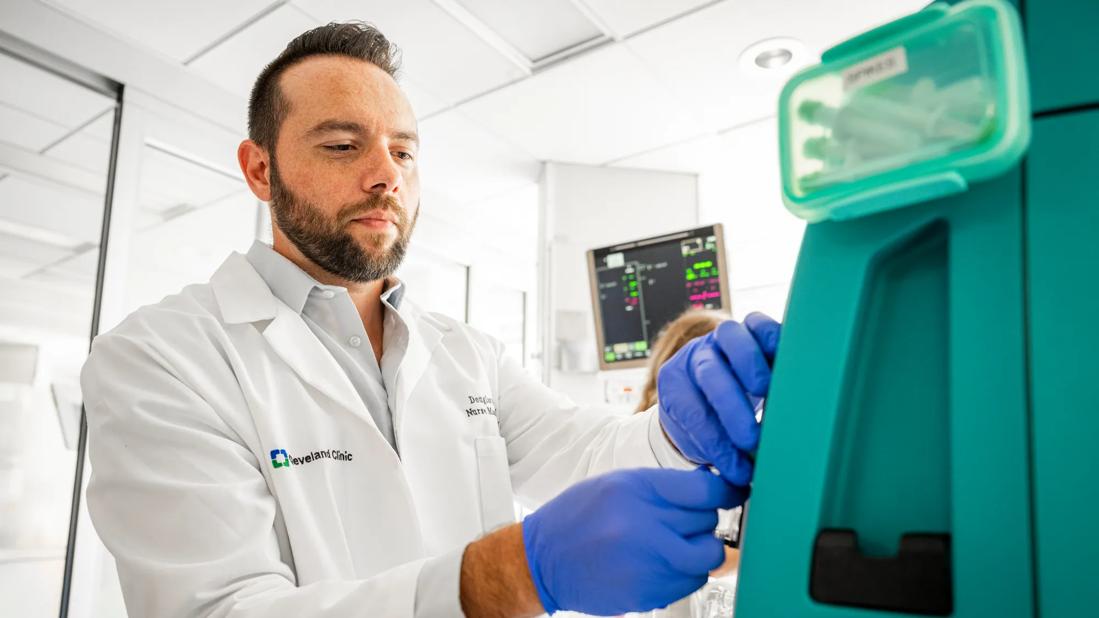Nurses harness cutting-edge technology as a bridge to healing

Image content: This image is available to view online.
View image online (https://assets.clevelandclinic.org/transform/9c7796ba-9d16-4366-9801-15b89dae58c1/NUR_6729408_08-13-25_039_SCG)
Nurse with dialysis machine
The liver performs hundreds of vital functions necessary to sustain life. When this essential organ fails, transplantation is often the only definitive treatment, but numerous factors — from organ shortages and strict eligibility criteria to underlying health conditions — can stand in the way.
Advertisement
Cleveland Clinic is a non-profit academic medical center. Advertising on our site helps support our mission. We do not endorse non-Cleveland Clinic products or services. Policy
Although supportive therapies like dialysis can temporarily manage symptoms, they cannot fully replace the liver’s vital functions. As a result, many patients face limited treatment pathways and challenging decisions that require them to weigh quality of life against the strain of aggressive interventions.
Now an advanced therapy that replaces the liver’s lost excretory and detoxification functions is giving new hope to Cleveland Clinic patients with reversible causes of acute liver failure.
Designed to remove protein-bound and water-soluble toxins from the bloodstream, the Molecular Adsorbent Recirculating System (MARS®) purifies blood by passing it through a specialized filter of albumin and activated charcoal before returning it to the patient’s circulation.
There are approximately 15 MARS machines in the United States that can be used to treat patients with liver failure — and two of them are located at Cleveland Clinic’s Medical Intensive Liver Unit (MILU), a subspecialty ICU within the Medical Intensive Care Unit.
By supporting the injured liver, MARS can help stabilize critically ill patients and give the liver time to regain normal function, explains Lynne Kokoczka, MSN, APRN-CNS, ACCNSAG, CCRN, Clinical Nurse Specialist at Cleveland Clinic’s Main Campus.
Unlike other types of life support, including extracorporeal membrane oxygenation (ECMO), ventilation and dialysis, MARS cannot be used indefinitely. Limited to five consecutive days of eight-hour treatments, the therapy can only serve as a bridge to either liver recovery or transplant.
Advertisement
“Without transplantation, outcomes are unpredictable in acute liver failure, and mortality can be as high as 80%,” Kokoczka says. “Unfortunately, transplantation may not be an option for those who lack a strong social support system or have a history of repeated intentional medication overdoses. For those patients, MARS can be lifesaving — a beacon of hope when there are few other options.”
Established in 2021, the MARS program relies heavily on the expertise of specially trained nurses to initiate the therapy, provide around-the-clock monitoring and intervene should any problems arise.
“It’s a unique feeling knowing that you are among only a handful of nurses in the world with the knowledge and ability to deliver life-changing therapy, and it’s been an honor to be able to teach and share this knowledge with other caregivers in the organization,” says MILU nurse Nicholas Koch, BSN, RN. “It truly is a team effort that makes this therapy successful, and it’s been amazing to see the difference it has made in patients’ treatment and prognosis.”
Nurses in the MILU work closely with a team of pharmacists and clinical specialists, including critical care physician Aanchal Kapoor, MD, and gastroenterologist Christina Lindenmeyer, MD, Co-directors of the MILU. Kokoczka says the team’s multidisciplinary approach is ideal for addressing the complex plan of care that acute liver failure requires.
“Communication is critical when managing patients as sick as those in the MILU, so we all work closely and collaboratively to provide the highest level of care possible,” she says. “MARS is a risky, time-intensive process that demands a lot of our caregivers, so it’s essential that we support and advocate for one another. Watching the team come together is like seeing a work of art.”
Advertisement
This coordinated effort becomes particularly important while the team is navigating the moral dilemmas that can arise when managing patients in the MILU, Kokoczka notes.
Among the chief causes of liver failure are intentional acetaminophen overdose and alcohol use disorder — both of which “require caregivers to leave their judgments at the door,” she says. “Our nurses are here to meet each and every patient where they are and help them recover.”
Staff Ethicist Jeffrey Pannekoek, PhD, notes that individual patient circumstances can affect what kinds of therapies are appropriate for patients, as they can help determine transplant candidacy.
“For qualifying patients, MARS is an amazing and ethically straightforward treatment because it is time-limited by design,” he says. “However, there are many ethical issues surrounding the clinical care of patients with liver failure and liver transplant, as well as research involving new therapies, including xenotransplant.”
Kokoczka says the MILU team is exploring several novel therapies for patients who are ineligible for transplantation, including miroliverELAP®, which uses a bioengineered porcine liver seeded with human hepatocytes to externally clean the patient’s blood. One of the first-ever human clinical trials to evaluate this new technology is currently underway at Cleveland Clinic.
“Liver failure is a devastating disease that progresses rapidly and often leaves patients with very few treatment options,” she adds. “We believe it’s essential to keep searching for new and better therapies that improve the odds of survival and recovery — and our nursing team is enormously proud to help guide that mission.”
Advertisement
Advertisement
Regional organizations collaborate to address nurse faculty shortage
How wellness habits help nurses flourish
Planning continues with critical, patient-focused input from nursing teams
Strengthening care through targeted resources and frontline voices
Embracing generational differences to create strong nursing teams
CRNA careers offer challenge and reward
An unexpected health scare provides a potent reminder of what patients need most from their caregivers
Cleveland Clinic Abu Dhabi initiative reduces ICU admissions and strengthens caregiver collaboration